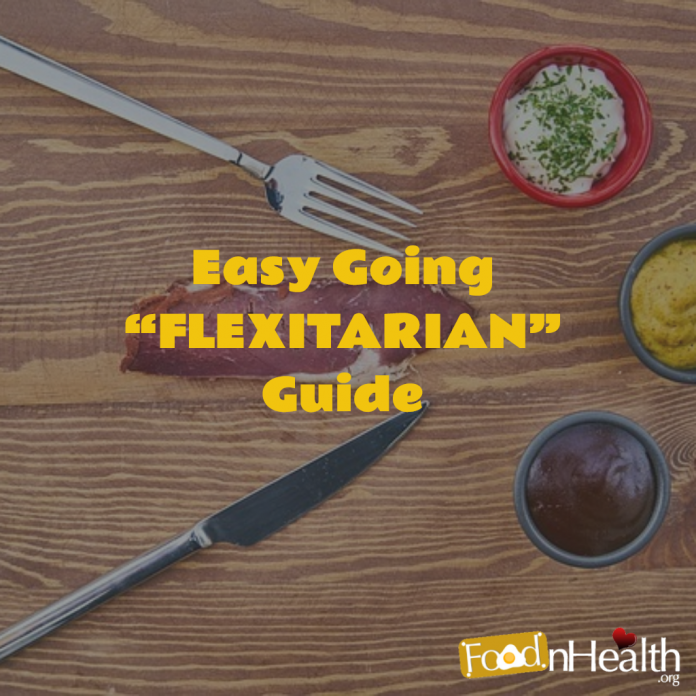WTF Is the Flexitarian Diet (And Should You Try It)?
Following a diet is not an easy task, especially if you are in lack of time and always on a hurry. And ask yourself, why do I need a diet? Is it because you want to lose weight, or maybe live healthier, or because you care about the animals and the environment, or you just want a change in your lifestyle? You’re in luck, with all those diets in the world and the books written about them, you have a wide range of choices.
But, if you are a vegetarian who craves about the occasional steak, or a carnivore that fears his health is going south, there is a diet that is just like made for you. It’s flexitarian diet, and as the name points out, it is flexible, so there is no strict direction, as a matter a fact, there are no clear directions at all. And that is probably that makes it so damn fun and interesting, probably because you are not on a strict regime, and you get to choose what to eat and when to eat it. There are some rules of course, or this diet would not have a name, and yes, there are books written about this particular diet so try and keep up.

As the name might give you a hint, this is not either a vegetarian diet, nor a carnivore diet, it is a mix of the both, leaning more to vegetarian, so this diet would be a smart choice for those who are trying on going vegetarian but still meet the difficulties of cutting down meat. And don’t think of this as a conventional diet, it is more of a change in your whole lifestyle, because not only will you eat different, you will feel different, and you might even lose some weight, but only some, because the main purpose of this diet is not weight loss. The main reason is cutting down meat and enrichening your diet with more veggies, becoming a flexible vegetarian, who is not so scared to cheat occasionally.
Then how much meat should I eat on the flexitarian diet?
As already mentioned there are no strict rules, only some guidelines, and they all agree that cutting down meat is mandatory, but to how much is where they differ. However, as a beginner flexitarian try and avoid meat only twice per week, or consume 800 g of meat for the first few weeks, and then continue to second tier, entering 500 g of meat for four days a week, and living vegetarian for the other three days. Finally, when you have already got your stomach costumed to less meat go big, and live as an expert flexitarian with 250 g of meat for only two days a week, and prioritize your consumption of veggies, because the end goal of this diet is exactly enlarging the vegetable and fruit consumption, while the meat cut down should be considered as a side effect! Replace the intake of meat based protein with protein from soy, quinoa, rice and beans, and try all the different recipes, meat free.

Benefits of the flexitarian diet
Look at it this way, you get all the upsides of vegetarian diet, plus you’re stress free because you can enjoy a burger now and then, and you get to try all those veggie recipes which are delicious and nutrient full.
– Cardiovascular health – studies have shown that a flexitarian diet of only two weeks lowers your LDL cholesterol (which is bad cholesterol) for 20 points, keeping your blood pressure lower and keeping your heart healthier. Plus plant based protein has much more fiber than meat based proteins.
– Cancer – lowering the income of red based meat will lower your chances of cancer for sure, and plant-based diets also reduce your chances of getting all types of cancer. You will be consuming way less saturated fat, and more phytochemicals and fiber, lowering the chances of breast, colon and gut cancer.
– Environmental – the less meat you consume, the more you fight the meat industry which is one of the main polluters in the world, and you are lowering the production of meat and slaughtering of animals (yes, one person does make a change).
– You save money – eating soy, lentils and beans will save money on your account, because grass fed beef and wild caught fish is very expensive, and not everybody can have it every day. But with flexitarian diet you can afford once or twice per week to have that wild caught salmon, and fill your system with the needed omega 3 fatty acids.
– Weight loss – although maybe not the best diet to lose weight is still gives very good results by lowering the calorie intake, and still filling you with the necessary nutrient from vegetables, fruits and whole grain.
Few flexitarian diet downsides you should notice
Getting off meat is not easy, especially if you have your share of meat every day, because at the beginning you will feel hungry most of the time, up until you discover all the veggies which are low in calories, but will fill your belly, just enough so you wouldn’t feel hungry. And find a way to replace the protein intake, have a salad and combine it with tofu, lentils and beans.
Also, if you are suffering from iron deficiency, be sure to take some supplements, not that there is not enough iron in plant based diets, it is because the absorption in our gut is different, and you might find it difficult to manage. Once or twice per week meat intakemight just not be enough for you. Also at the beginning watch closely your B12 and Vitamin D levels and your calcium as well, and if necessary keep your yogurt at hand, at least for the first couple of weeks.
Flexitarian diet recipes
This list is endless, and is being updated as we speak, and this trend will go on, because more and more people are turning vegetarian every day, and more and more veggies are becoming famous because of their nutritional value. Plus side of this diet is you get to combine the best of veggies with the best meat, and cut down on sausages, bacon and other industrially processed meat. So just open any vegetarian cookbook and enjoy the dish, and every now and then, treat yourself a burger, being flexitarian gives you the right to “cheat”.
References:
- https://www.shape.com/healthy-eating/diet-tips/flexitarian-diet-how-to
- https://www.bbcgoodfood.com/howto/guide/what-flexitarian-diet
- http://www.health.com/food/flexitarian-diet
- https://draxe.com/flexitarian/
- https://www.ncbi.nlm.nih.gov/pmc/articles/PMC5216044/
- https://www.healthbeckon.com/flexitarian-diet/
- https://greatist.com/eat/flexitarian-diet
- https://www.livestrong.com/slideshow/1011121-going-flexitarian-11-easy-lifestyle-shifts-can-make/


























